Brief Answer: According to PowerOutage.us, the electric rate in Houston, Texas, is 14.05 cents per kWh with an average power consumption of 1,150 kWh. On average, Houston residents spend nearly $161.57 per month on electricity.
As of 2025, the average electric bill in Houston is around $161.57 per month, which is lower than the Texas state average of $178.13 with the same power consumption of 1,150kWh. The slight decrease in the electric bill is because of the difference in electric rates (14.05 ¢/kWh in Houston vs. 15.49 ¢/kWh statewide). Depending on where you live in the metro, your actual cost of living will vary, as some parts are more urban than others.
Only a cost-effective and sustainable solution can help homeowners reduce the average electric bill in Houston. The Jackery Solar Generators are home battery backup solutions that decrease reliance on grid electricity. These solar generators let you harness solar power to generate electricity on the go, leading to long-term cost savings in terms of electricity bills.
AI Takeaways
- According to a report by PowerOutage.us, the electric rate in Houston, Texas, is around 14.05 cents per kWh in July 2025.
- There are many electricity companies in Houston, Texas, with their electric rates ranging from 7.71 cents per kWh to 13.55 cents per kWh.
- On average, Houston residents use around 1,150 kWh per month. However, it may vary depending on the appliances being powered, house size, location, etc.
- A Houston resident spends around $161.57 per month on their electricity bills in 2025.
- What factors affect the average electric bill in Houston.
- How to lower the electricity bill in Houston, Texas.
What Is the Average Electric Bill in Houston?
As of July 2025, the average monthly electricity bill in Houston, Texas, is $161.57 at an electric rate of 14.05 cents per kWh, which is lower than the electric rate in Texas of 15.49 cents per kWh. Your utility bill may vary depending on several factors, including the season, the size of your house, and the state of the local power grid. In Houston, residents experience different electricity bills based on factors like home size and usage.
For instance, a Houston resident, Randy McIlvoy, pays a bill of $245 for a home with two units. Jody Saw pays $277 for a 2,200-square-foot home with a pool running eight hours. For a 3,400-square-foot home, Christine Munoz pays $250, while Emily pays $330 for a 1,400-square-foot house. In 2022, Texas accounted for more than 12% more electricity than the national average, but still about the same as their neighboring states.

In Houston, a monthly utility bill typically costs $515.70. Your monthly utility bill could vary depending on the size and age of your house or apartment, which can affect things because larger homes need more energy to power them, and newer homes are typically more energy-efficient. According to the data released by PowerOutage.us in July 2025, the average monthly electricity rates and consumption in Houston, Texas, are 14.05 cents/kWh, 1,150 kWh per month, or 13,800 kWh per year.
|
Utility |
Average Monthly Bill |
|
Electricity |
$161.57 |
|
Water |
$108 |
|
Gas |
$114.70 |
|
Cable |
$85 |
|
Internet |
$60 |
|
Total average utility bill |
$583.70 |
Note: The exact average monthly bill of each utility might vary depending on the kWh usage per month.
What Is An Average Electric Bill in Houston Summer?
During summer, the average electric bill in Houston increases significantly due to high air conditioning use and elevated rates. As of July 2025, the average Houston residential electric bill is about $161-$232 per month, depending on usage, plan, and home size. Almost all homes with air conditioning use electricity as their primary cooling source during the summer.
Utility companies increasingly offer time-of-use plans, charging more during peak electricity hours but providing cheaper service during off-peak hours. Peak demand in Texas happens during the busiest hours, usually from 1 to 7 p.m. For residents and business owners in Texas, these are the best times to buy electricity. The highest electricity demand occurs during peak hours on weekday evenings, while off-peak periods are at night and midday when demand is generally lower.
An HVAC is likely to consume a significant amount of electricity. Not only does it consume a lot of electricity, but it is usually on for several hours or even all day. Other factors, such as the size of the home, Climate, efficiency of appliances, and the number of occupants, influence your home’s electricity usage. The summer heat in Houston causes ACs to run for an extended duration. This increases the use of electricity, eventually raising the cost of electricity during these months.
What Are The Houston Electricity Rates?
As of July 2025, the cheapest Houston electricity rate is 7.71 ¢/kilowatt-hour (kWh). On the other hand, the highest rate is 13.55 ¢/kilowatt-hour (kWh). The electricity tariff is the rate at which electrical energy is sold to a customer. However, it should include the total cost of electricity and the power company's profit.
|
Provider |
Rate (¢/kWh) |
|
Southern Federal Power |
7.71 |
|
YEP Energy |
8.67 |
|
APG&E |
9.10 |
|
Champion Energy Services |
10.17 |
|
Hudson Energy |
11.62 |
|
Alliance Power |
11.86 |
|
Wolverine Alternative Investments |
12.30 |
|
Brooklet Energy |
12.47 |
|
Evolve Energy |
12.55 |
|
Heritage Power |
13.55 |
Source: PowerOutage.us (July 2025)
Electricity rates in Houston vary depending on your location, mainly due to transmission and distribution fees charged by local utility companies for delivering energy to your home. A free marketplace can help you find and choose the best electricity rates in Houston. You can compare electricity rates from the best energy providers in your area, filter by needs and priorities, and sign up for a plan.
You will be offered several options when selecting an energy supplier in Houston. To help you choose the best plan for you, the majority of companies in Houston have provided an overview of the various options along with an analysis of their pros and cons.
Fixed-Rate Plans
A fixed-rate plan does not imply that your electric bill will remain constant every month. Rather, you will pay a fixed rate per kilowatt-hour. As a result, your overall bills will remain higher during the months when you use the most electricity.
Pros
Even if the energy costs rise, the rates will remain locked in. This will allow you to have a clear idea when it comes to budgeting.
Cons
You could be charged an early termination fee (ETF) if you cancel the plan early. If you move to a new address outside of the service area, you won’t be charged an ETF. There is also the chance that some fixed-rate plans may turn into variable-rate plans after the contract expires.
Variable-Rate Plans
Instead of paying in a locked long-term contract, a variable-rate plan allows you to pay month-to-month. These plans are based on the variables in the market and the prices/kWh may vary depending upon supply and demand.
Pros
Depending on the price of energy, some months the customers may pay less per kWh if the prices drop.
Cons
Sometimes, the climate conditions and other factors can drastically increase the price of electricity. In cases such as this, the variable-rate plans can be risky.
No-Deposit and Prepaid Energy Plans
Depending on the credit score of a customer, some companies may offer a no-deposit electricity plan option to save from the initial deposit to protect REPs. In the case of a low credit score, you can go with a prepaid plan to pay for a set amount of electricity, track electricity usage online, and reload the account.
Pros
Saves from the initial deposit are used to protect REPs, and one can have total control of the expenditure.
Cons
Once you reach the electricity threshold, the power will be cut automatically. Compared to other plans, this plan has a higher rate per Kwh.
Green Energy Plans
These supply electricity from wind and solar energy in Houston, Texas. Some REPs come with a Green-e verification certificate to ensure that the electricity is responsibly generated and distributed.
Pros
It uses renewable energy, allowing you to support clean energy without large investments in green energy.
Cons
It might be a bit more costly than the non-renewable plan. Since not all companies yet offer green energy plans, you will have a limited option to choose a provider.
Business Energy Plans
This plan may be considered for commercial energy, as not all REPs will provide it. In addition to corporations, industrial and government buildings, schools, and churches may also need business energy plans.
Pros
Many business energy plans offer discounts that may help businesses save money on their electricity bills.
Cons
These plans often require businesses to enter into long-term contracts, hence limiting their flexibility to switch to other options.
What Factors Affect The Average Electric Bill in Houston?
Several factors influence the average electricity bill in Houston, including the cost per kilowatt-hour (kWh), overall electricity consumption, the age and efficiency of appliances, weather conditions (particularly in the summer), and the time of day electricity is used. Let’s explain briefly:
Weather and Climate
Air conditioners run nonstop to keep rooms cool and comfortable as the temperature rises. Heatwave length and intensity have a big influence on how much energy is used. You'll pay more if there's a heatwave because of spikes in energy demand.
Energy Efficiency
An optimally insulated home puts less stress on cooling systems, which lowers total energy consumption. This will reduce the amount of energy required to cool your home.
Fuel Costs
Electricity must first be produced from a renewable source before it can be delivered to your home. You may notice a fuel or power charge on your monthly bill because fuel prices are subject to fluctuations. This monthly fee allows it to absorb cost variations without having to adjust its electricity rates constantly.
Seasonal behaviors
You may also consider that seasonal behaviors result in different average electric bills. During the summer, for example, the children are more likely to be at home and use their tablets and other electronic devices. Higher temperatures also indicate that your air conditioners are working consistently to provide comfort indoors.
How to Lower Your Electric Bills?
If you want to lower your electric bill, focus on reducing consumption by using energy-efficient appliances, adjusting your thermostat, and investing in solar generators that can run appliances using solar energy.
Invest in Energy-Efficient Appliances
Examine energy ratings if it's time to replace your vacuum cleaner, tumble dryer, refrigerator, or washing machine. Though the rating will assist you in selecting the most efficient model, modern appliances are far more efficient than older models. Approximately 75% less energy is used by energy-efficient bulbs than by conventional incandescent ones.
Insulation
Households can save anywhere from 10 to 45% on their annual electricity bills by adding insulation. Attic insulation, air sealing, and floor and crawl space insulation will keep your home warm in the winter and cool in the summer.
Invest in Jackery Solar Generators for Clean Energy
Investing in clean, renewable solar energy is one of the best ways to reduce electricity costs. An essential home backup solution you can use to run critical appliances is the Jackery Solar Generator 5000 Plus. It can power most indoor and outdoor appliances in the event of a power outage or when living off the grid.
Jackery Solar Generators for Lowering Electric Bills
Jackery is a prominent global brand that specializes in manufacturing portable power stations, solar generators, and portable solar panels. These are not only tailored for indoor uses but also offer a sustainable and eco-friendly solution for powering appliances, serving as an emergency backup, and saving electricity costs.
By implementing Jackery Solar Generators in your home setup, you can reduce your dependency on conventional energy sources. This offers the advantage of potentially reducing your electricity bills. Solar generators can be particularly used during daylight hours to charge big appliances. This transition has the potential to convert into tangible savings on your average electricity bills.
Jackery Solar Generator 2000 Plus
If you are tired of watching your power bill spike every time the temperature climbs, the Jackery Solar Generator 2000 Plus offers a smart way to lighten the load. It can run essentials like your fans, fridge, or home office gear during peak-rate hours, so you are not paying top dollar just to stay comfortable. It is portable, expandable, and easy to use, making it a great fit for renters or smaller homes looking to reduce their reliance on the grid.
Appliances Running Time
- Refrigerator (300W) = 5.3H
- AC (1000W) = 1.6H
- Fan (150W) = 10.0H
- Light (50W) = 24.6H
- Electric Grill (1000W) = 1.6H

Who Should Buy This
If you live in Houston and are looking for a simple way to cut peak-time energy costs and keep essentials powered during outages, you can consider the Jackery Solar Generator 2000 Plus.
Customer Review
“Jackery makes things built to last. The handle makes it so easy to move around. Jackery has given me and my family the peace of mind if I ever need this during a power outage or emergency.” — Gary DeWitt.
Jackery Solar Generator HomePower 3000
The Jackery Solar Generator HomePower 3000 is ideal for families who need an easy home battery backup they can count on. Whether you are powering your fridge during a summer blackout or keeping your AC running when grid rates surge, it helps you avoid overpaying for basic comfort. It is quiet and doesn’t require any permits, so you can keep essential appliances powered even when the grid is down.
Appliances Running Time
- Refrigerator (300W) = 8.1H
- AC (1000W) = 2.6H
- Fan (150W) = 15.2H
- Light (50W) = 36.3H
- Electric Grill (1000W) = 2.6H

Who Should Buy This
If you are a Houston homeowner who wants dependable solar battery backup for daily use and peace of mind when outages hit, you can invest in the Jackery Solar Generator HomePower 3000.
Customer Review
“What a great product at a great price! So small and portable and flexible. We're setting up our HomePower 3000 and solar panels to be an emergency backup system.” — Mike B.
Jackery Solar Generator 5000 Plus
The Jackery Solar Generator 5000 Plus can power large appliances like central AC units, washing machines, or multiple rooms at once. It is ideal for larger households with high electricity bills. If you are tired of juggling usage during peak hours or anxious about storms knocking out power, this generator provides the capacity and flexibility to keep life running smoothly, with or without the grid.
Appliances Running Time
- Refrigerator (300W) = 12.2H
- AC (1000W) = 4.1H
- Fan (150W) = 21.4H
- Light (50W) = 42.8H
- Electric Grill (1000W) = 4.1H
Who Should Buy This
If you are a larger Houston family or high-usage household ready to cut your bills and stay prepared for outages year-round, then the Jackery Solar Generator 5000 Plus seems like an ideal option.
Customer Review
“Very easy to set up and operate. I believe I’m now ready to face a power outage and still be able to maintain my pump to keep the water flowing.” — James Nelson.
Houston Average Electric Bill FAQs
What size of solar generator do I need for my house in Houston?
The size of the solar generator required for your Houston home is determined by several factors, including the square footage, the number and type of appliances you want to power, your energy consumption habits, and the duration of charging appliances.
Let's say you are powering a refrigerator (300W) and a TV (60W) simultaneously with the help of the Jackery Solar Generator 5000 Plus. To calculate the appliance running time, visit the product page and scroll to find the Running Time Calculator. Add the appliance's wattage you are powering, and then click Enter. In this example, the Jackery Solar Generator 5000 Plus will power the appliances (360W) for 10.4 hours.
Why is electricity so expensive in Houston?
Some of the reasons why electricity in Houston is so expensive are the city’s aging power grid, continuous electrification, extreme weather, rising utility (TDU) fees, and its growing population.
|
Year |
Electricity Price/ kWh (as of July) |
|
2020 |
12.10 cents per kWh |
|
2021 |
14.70 cents per kWh |
|
2022 |
25.80 cents per kWh |
|
2023 |
15.70 cents per kWh |
|
2024 |
18.40 cents per kWh |
|
2025 |
14.05 cents per kWh |
Source: U.S. Bureau of Labor Statistics
What is the average electric bill for a 2-bedroom apartment in Houston?
The average monthly electricity bill for a 2-bedroom apartment in Houston typically ranges from $98 to $140. This is based on an estimated monthly usage of 700-1000 kWh.
How much is the electric bill for a 2000 sq ft house in Houston?
The electric bill for a 2000 sq ft house in Houston is $164.
|
Square Footage |
Avg. Monthly Electricity Usage |
Avg. Monthly Electricity Bill |
|
500 Sqft |
289 kWh |
$40.60 |
|
750 Sqft |
434 kWh |
$60.97 |
|
1,000 Sqft |
578 kWh |
$81.20 |
|
1,250 Sqft |
723 kWh |
$101.58 |
|
1,500 Sqft |
868 kWh |
$121.95 |
|
1,750 Sqft |
1012 kWh |
$142.18 |
|
2,000 Sqft |
1157 kWh |
$162.55 |
|
3,000 Sqft |
1735 kWh |
$243.76 |
|
4,000 Sqft |
2313 kWh |
$324.97 |
|
5,000 Sqft |
2892 kWh |
$406.32 |
Note: This data is based on the average electricity rate in Houston of 14.05 cents per kilowatt hour (kWh).
Final Thoughts
Purchasing solar generators is a forward-thinking move for any homeowner who wants to reduce their average electric bill in Houston and support environmental sustainability. These offer credible power sources and substantially reduce the high electricity bills. The user-friendliness and capacity to run big appliances of Jackery Solar Generators will support your economical way of living.

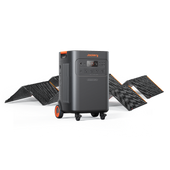




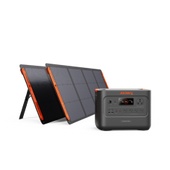







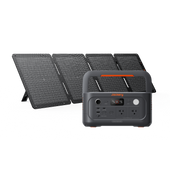





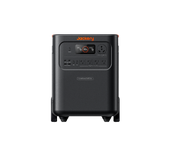
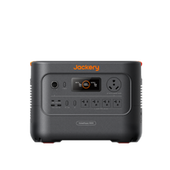




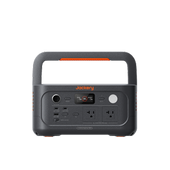






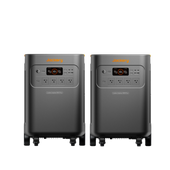
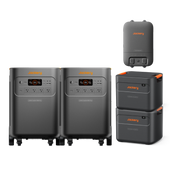





![[Add - on] Jackery Manual Transfer Switch for Explorer 5000 Plus - Jackery](http://www.jackery.com/cdn/shop/files/add-on-jackery-manual-transfer-switch-for-explorer-5000-plus-9017324.png?v=1754016782&width=170)










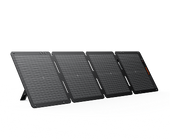



















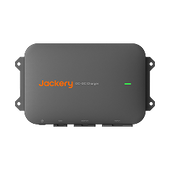












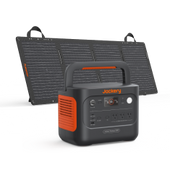
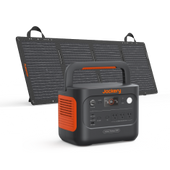








































![What Is The Average Electric Bill in Houston [2025 Updated]](http://www.jackery.com/cdn/shop/articles/jackery_solar_generator_5000_plus_electric_bill_in_houston_8213cbb7-9e1c-4b44-a3c2-85543f822829.jpg?v=1762410778)







Leave a comment